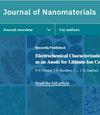雷公霉素共轭硫化铋纳米颗粒(Bi2S3@BSA)在乳腺癌细胞放疗中的放射敏感性增强
4区 材料科学
Q2 Materials Science
引用次数: 0
摘要
本研究的目的是评估硫化铋纳米颗粒结合促性腺激素释放激素的合成激动剂类似物在乳腺癌靶向放疗中的放射敏感性。纳米颗粒的合成和表征完成后,采用MTT法测定纳米颗粒的细胞毒性,采用菌落形成法测定纳米颗粒的存活率。最后用流式细胞术鉴定放射线致敏的机制。表征结果确定了Bi2S3@BSA的球形,平均尺寸为8.649±1.6 nm,傅里叶变换红外证实了triptorelin在纳米颗粒表面的成功结合。MTT试验结果显示Bi2S3@BSA -triptorelin在75 μg/ml浓度下也无毒性反应(P < 0.05)。在所有剂量的电离辐射下,集落形成试验显示,与Bi2S3@BSA相比,无毒浓度Bi2S3@BSA -triptorelin显著增加MCF-7细胞的细胞死亡(P < 0.05)。细胞凋亡试验也证实了所有剂量下集落形成试验的结果,并将细胞凋亡作为纳米颗粒产生放射敏感性的机制。当然,靶向硫化铋纳米粒子可能是增加对肿瘤细胞放射敏感性的一个很好的候选者。本文章由计算机程序翻译,如有差异,请以英文原文为准。
Radiosensitivity Enhancement using Triptorelin Conjugated Bismuth Sulfide Nanoparticles (Bi2S3@BSA) in Radiotherapy for Breast Cancer Cells
The aim of this study was to assess the radiosensitivity of bismuth sulfide nanoparticles conjugated with a synthetic agonist analog of gonadotropin-releasing hormones in targeted radiotherapy for breast cancer. After synthesis and characterization of nanoparticles, cytotoxicity of nanoparticles was measured by MTT assay, and the survival fraction was determined by colony formation assay. Finally, flow cytometry was performed to identify the mechanism of radiosensitization. Characterization results determined the spherical shape of Bi2S3@BSA with an average size of 8.649 ± 1.6 nm, and Fourier transform infrared confirmed the successful binding of triptorelin to the surface of the nanoparticles. MTT test results show that the Bi2S3@BSA–triptorelin did not cause any toxicity (
P
<
0.05
) even up to 75 μg/ml. At all doses of ionizing radiation, colony formation assays showed that the nontoxic concentration of Bi2S3@BSA–triptorelin significantly increased cell death in MCF-7 cells compared to Bi2S3@BSA (
P
<
0.05
). The apoptosis test also confirmed colony formation assay results at all doses and introduced apoptosis as a mechanism of radiosensitivity produced by nanoparticles. Certainly, targeted bismuth sulfide nanoparticles can be a good candidate for increasing radiosensitivity against tumor cells.
求助全文
通过发布文献求助,成功后即可免费获取论文全文。
去求助
来源期刊

Journal of Nanomaterials
工程技术-材料科学:综合
CiteScore
6.10
自引率
0.00%
发文量
577
审稿时长
2.3 months
期刊介绍:
The overall aim of the Journal of Nanomaterials is to bring science and applications together on nanoscale and nanostructured materials with emphasis on synthesis, processing, characterization, and applications of materials containing true nanosize dimensions or nanostructures that enable novel/enhanced properties or functions. It is directed at both academic researchers and practicing engineers. Journal of Nanomaterials will highlight the continued growth and new challenges in nanomaterials science, engineering, and nanotechnology, both for application development and for basic research.
 求助内容:
求助内容: 应助结果提醒方式:
应助结果提醒方式:


